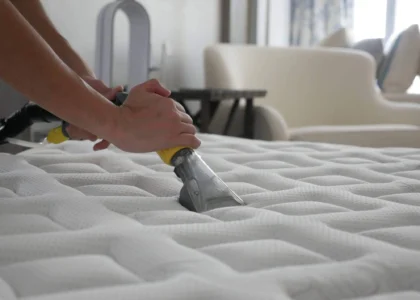The rainy season, while bringing joy and greenery, often leads to increased cleaning demands due to mud, pests, and musty smells. This guide offers practical tips for homeowners and working professionals to effectively manage monsoon-related messes, maintaining a fresh and germ-free home environment throughout the season.

1. Keep the Dirt Outside
The biggest mess during monsoon season comes from muddy shoes. Here’s how to control it:
Use Doormats:
- Place coarse doormats outside and soft, absorbent ones inside.
- Regular cleaning prevents the accumulation of mud and germs.
Set a Shoe Rack Near the Door:
- Create a small shoe storage area near the main entrance.
- To maintain cleanliness, it is recommended that family members remove their shoes before entering the house. This practice helps prevent the spread of dirt and debris indoors.
2. Beat the Damp Smell
Monsoon = Moisture. And moisture = musty smell. Here’s how to keep your home fresh:
Ventilate Your Rooms:
- Opening windows when the weather is dry.
- Use fans to circulate air.
Use Natural Deodorizers:
To keep your home smelling fresh while cleaning, use a floor cleaner that contains either fragrant phenyl or lemon.
3. Keep Humidity in Control
High humidity promotes the growth of fungus and mold, which can cause respiratory problems.
Use a Dehumidifier:
- Salt or rice bowls can be used as affordable alternatives for absorbing moisture.
- If possible, purchase a portable dehumidifier.
Dry Clothes Properly:
- To expedite the drying of clothes, utilize hangers and drying racks in well-ventilated areas such as near windows, or employ a fan to enhance air circulation and reduce drying time.
- Never leave wet clothes inside for long.
4. Don’t Ignore the Corners
Corners are a favorite hiding place for fungi and insects.
Deep Clean Weekly:
- The specific areas in a home that require focused cleaning attention: bathroom corners, under beds, behind sofas, and kitchen shelves.
- Use antifungal sprays or vinegar solutions.
5. Keep Your Kitchen Safe and Dry
The monsoon season causes cockroaches and ants to be drawn to kitchens.
Store Food Carefully:
- Airtight containers should be used for storing snacks, grains, and spices.
- Regular weekly checks of cabinets are recommended to identify any signs of moisture or pest presence.
Keep Surfaces Dry:
- You should use a disinfectant spray in the evening or nighttime to eliminate germs (bacteria, viruses, etc.) and insects.
- To maintain cleanliness, it is recommended to wipe kitchen surfaces, including countertops and sinks, dry after each use.
6. Bathroom Cleaning Can’t Be Ignored
Wet bathrooms foster the growth of harmful organisms like bacteria, fungus, and insects.
Use Harpic or Bleach:
To keep your toilet clean, you should use a powerful cleaning product to scrub both the inside of the toilet bowl and the surrounding floor every two to three days. This regular cleaning helps to prevent the buildup of dirt, stains, and germs.
Don’t Forget the Drains:
To prevent drain blockages and unpleasant odors, it is recommended to pour hot water and disinfectant into drains on a weekly basis.
7. Sofa & Carpet Cleaning is a Must
Sofas and carpets readily soak up moisture, which then leads to the rapid development of a musty and unpleasant odor. This is because the moisture gets trapped within the fibers, creating an environment where dirt and odor-causing substances thrive.
Vacuum Regularly:
You should use a vacuum cleaner to clean a surface by removing dust and any moisture that might be present.
Get Professional Help:
Dusting Group offers sofa and carpet deep cleaning in Mohali, Chandigarh, Panchkula, Zirakpur, and New Chandigarh, providing a service for a fresh and germ-free home.
9. Keep Windows and Curtains Dry
Rainwater may infiltrate buildings through window leaks or by splashing onto curtains.
Check for Leaks:
Sealing windows and doors to prevent water leakage.
Use Waterproof Curtains:
During the rainy season, it’s a good idea to use curtains made of light, quick-drying fabrics. This helps prevent the curtains from getting heavy and damp, and allows them to dry quickly if they do get wet.



